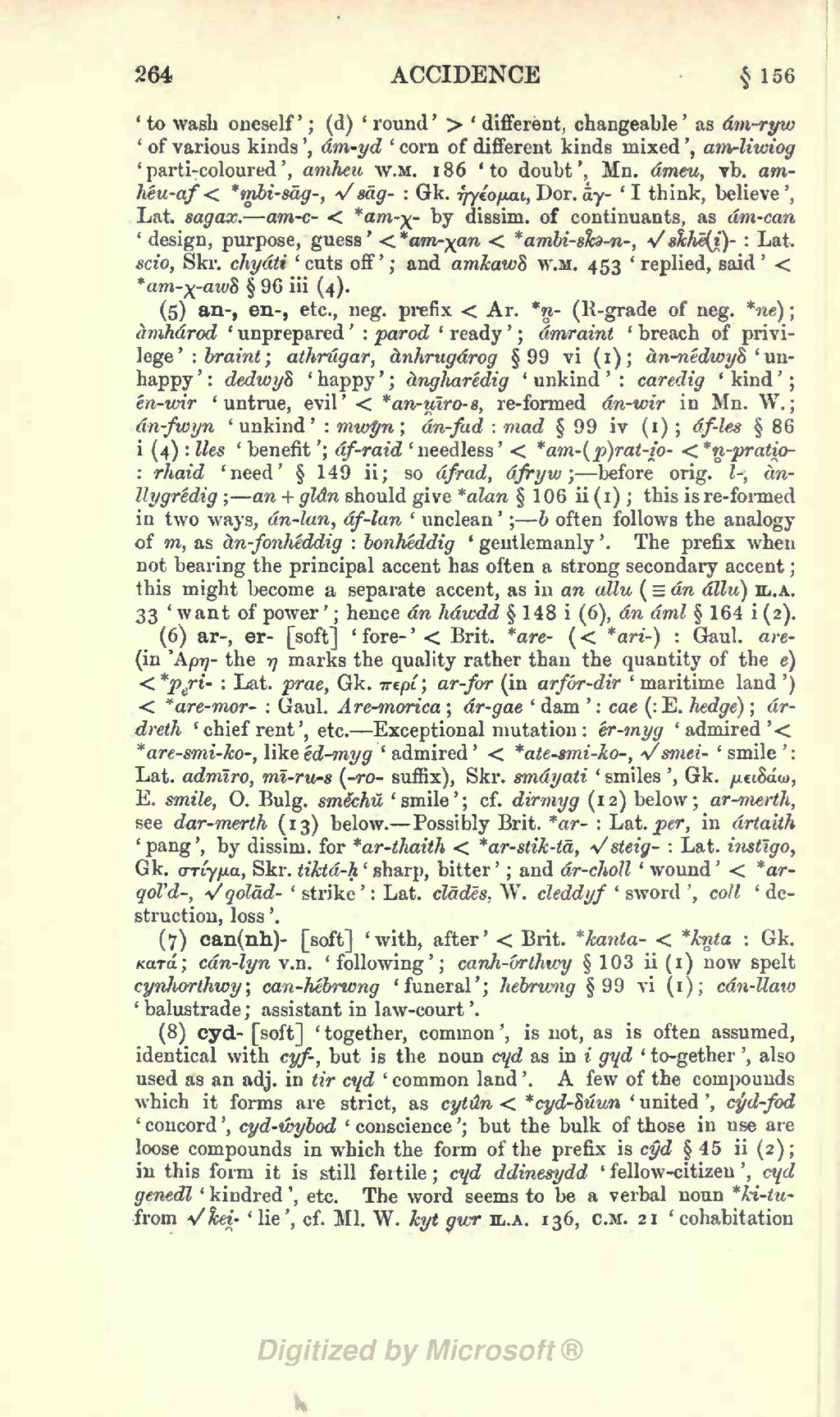‘to wash oneself’; (d) ‘round’ > ‘different, changeable’ as ám-ryw ‘of various kinds’, ám-yd ‘corn of different kinds mixed’, am-liwiog ‘parti-coloured’, amheu w.m. 186 ‘to doubt’, Mn. ámeu, vb. am-héu-af < *m̥bi-sāg‑, √sāg‑: Gk. ἡγέομαι, Dor. ᾱ̔γ- ‘I think, believe’, Lat. sagax.—am‑c- < *am‑χ- by dissim. of continuants, as ám-can ‘design, purpose, guess’ < *am-χan < *ambi-sk̑ə‑n‑, √sk̑hē(i̯)‑: Lat. scio, Skr. chyáti ‘cuts off’; and amkawẟ w.m. 453 ‘replied, said’ < *am-χ‑awẟ § 96 iii (4).
(5) an‑, en‑, etc., neg. prefix < Ar. *n̥- (R-grade of neg. *ne); àmhárod ‘unprepared’: parod ‘ready’; ámraint ‘breach of privilege’: braint; athrúgar, ànhrugárog § 99 vi (1); àn-nédwyẟ ‘unhappy’: dedwyẟ ‘happy’; àngharédig ‘unkind’: caredig ‘kind’; én-wir ‘untrue, evil’ < *an-u̯īro‑s, re-formed án-wir in Mn. W.; án-fwyn ‘unkind’: mwyn; án-fad: mad § 99 iv (1); óf-les § 86 i (4): lles ‘benefit’; áf-raid ‘needless’ < *am-(p)rat-i̯o- < *n̥-prati̯o‑: rhaid ‘need’ § 149 ii; so áfrad, áfryw;—before orig. l‑, àn-llygrédig;—an + glân should give *alan § 106 ii (1); this is re- formed in two ways, án-lan, áf-lan ‘unclean’;—b often follows the analogy of m, as àn-fonhéddig: bonhéddig ‘gentlemanly’. The prefix when not bearing the principal accent has often a strong secondary accent; this might become a separate accent, as in an allu (≡ án állu) Ỻ.A. 33 ‘want of power’; hence án háwdd § 148 i (6), án áml § 164 i (2).
(6) ar‑, er- [soft] ‘fore‑’ < Brit. *are- (< *ari‑): Gaul. are- (in Ἀρη- the η marks the quality rather than the quantity of the e) < *pₑri‑: Lat. prae, Gk. περί; ar-for (in arfór-dir ‘maritime land’) < *are-mor‑: Gaul. Are-morica; ár-gae ‘dam’: cae (: E. hedge); ár-dreth ‘chief rent’, etc.—Exceptional mutation: ér-myg ‘admired’ < *are-smi-ko‑, like éd-myg ‘admired’ < *ate-smi-ko‑, √smei- ‘smile’: Lat. admīro, mī-ru‑s (‑ro- suffix), Skr. smáyati ‘smiles’, Gk. μειδάω, E. smile, O. Bulg. směchŭ ‘smile’; cf. dirmyg § (12) below; ar-merth, see dar-merth § (13) below.—Possibly Brit. *ar‑: Lat. per, in ártaith ‘pang’, by dissim. for *ar-thaith < *ar-stik-tā, √steiɡ-: Lat. instīgo, Gk. στίγμα, Skr. tiktá‑ḥ ‘sharp, bitter’; and ár-choll ‘wound’ < *ar-qol’d‑, √qolād- ‘strike’: Lat. clādēs, W. cleddyf ‘sword’, coll ‘destruction, loss’.
(7) can(nh)- [soft] ‘with, after’ < Brit. *kanta- < *kn̥ta: Gk. κατά; cán-lyn v.n. ‘following’; canh-órthwy § 103 ii (1) now spelt cỿnhorthwy; can-hébrwng ‘funeral’; hebrwng § 99 vi (1); cán-llaw ‘balustrade; assistant in law-court’.
(8) cyd- [soft] ‘together, common’, is not, as is often assumed, identical with cỿf‑, but is the noun cɥd as in i gɥd ‘to-gether’, also used as an adj. in tir cɥd ‘common land’. A few of the compounds which it forms are strict, as cỿtûn < *cỿd-ẟúun ‘united’, cỿ́d-fod ‘concord’, cỿd-ẃybod ‘conscience’; but the bulk of those in use are loose compounds in which the form of the prefix is cŷd § 45 ii (2); in this form it is still fertile; cɥd ddinesydd ‘fellow-citizen’, cɥd genedl ‘kindred’, etc. The word seems to be a verbal noun *ki-tu- from √k̑ei̯- ‘lie’, cf. Ml. W. kyt gwr Ỻ.A. 136, c.m. 21 ‘cohabitation
